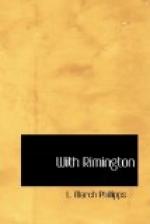Our action with Olivier is a rather stupid one, and I shall not attempt to describe it. We take the first position, losing from forty to fifty men, only to find that the enemy have retired to the second range, and that it is too late to follow them up. Probably the only man at all satisfied with the day’s performance is old Mac.
Through a weary land we have come marching north these ten days. The veldt is at its worst, parched and dry and dead. Our column trekking raises a huge cloud of reddish dust that hangs still in the air, and marks for miles back the way we have come. The whole expanse is quite colourless—almost white, or a dirty grey. All day long the blue sky is unvaried, and the sun glares down unobscured by a cloud; sky and earth emphasising each other’s dull monotony. Only at sunrise and late evening some richer and purer lines of colour lie across the distant plain, and the air is fresh and keen. Round about the town, which, like all these Boer towns, stuck down in the middle of the veldt, reminds one of some moonstruck flotilla becalmed on a distant sea, the grass is all worn and eaten to the very dust. Whiffs of horrid smell from dead carcases of horses and cattle taint the air. All the water consists of a feeble stream, stagnant now and reduced to a line of muddy pools, some reserved for horses, some for washing, and some for drinking, but all of the same mud colour.
And yet even for this country, I think it with a kind of dull surprise as I look out over the naked hideousness of the land, men can be found to fight. What is it to be a child of the veldt, and never to have known any other life except the life of these plains? It is to reproduce in your own nature the main features of this extraordinary scenery. Here is a life of absolute monotony, a landscape, huge, and on a grand scale, but dull and unvaried, and quite destitute of any kind of interest, of any noteworthy detail, of any feature that excites attention and remark. And the people, its children, are like unto it. Their minds are as blank, as totally devoid of culture and of ideas as the plains around them. They have an infinite capacity for existing without doing anything or thinking anything; in a state of physical and mental inertia that would drive an Englishman mad. A Boer farmer, sitting on his stoep, large and strong, but absolutely lethargic, is the very incarnation of the spirit of the veldt. At the same time, when one remembers the clatter and gabble of our civilisation, it is impossible to deny him a certain dignity, though it may be only the dignity of cattle.




